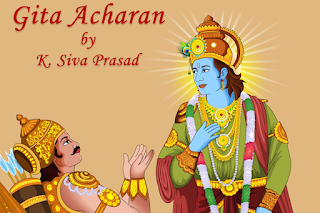261. Shed the Ahankaar

Krishna says, "Abandon all dharmas and take refuge in Me alone. I will liberate you from all sins, grieve not" (18.66). While verse 2.14 can be taken as the beginning of the Bhagavad Gita where Krishna says to ignore the transient pleasure-pain polarities which are caused when senses meet sense objects, the verse 18.66 can be considered as the end of the Gita. Krishna uses the word ' dharma ' and certainly he is not referring to religion or faith or righteousness as all of them have different meanings to different people. Bhagavad Gita is not a book of religion but of natural principles that govern our lives. On the other hand, a lot of clarity comes if we take paradigm or subjective reality as the meaning of dharma. Paradigm is the combination of our opinions, imaginations and understandings about the things around us or the way things are from our point of view. It is like the partial understanding formed about an elephant by a blind person by touching only a pa...

